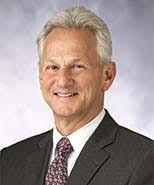
I’ve never been one to shy away from speaking my opinion, and Bob encouraged that with maybe a little bit more refinement in tone and delivery. But he always encouraged me to be who I am.
Scott Millimet
When did you meet Bob?
Probably ten years ago. Bob was a mentor and consultant to many of us on the management team at PIMCO.
Bob’s coaching brought out my best qualities in terms of being a leader.
When did you start working together?
We bonded pretty quickly through those sessions at PIMCO. We began corresponding and continue to correspond to this day.
How has he helped you build a winning team?
Basically the focal point on three things: number one, the qualities behind successful leadership; number two, a real focus on ethics and making ethics a big part of both client interactions and management responsibilities; and number three, the need to be yourself.
One of the things Bob is very instrumental with is that you can have a strong opinion, but you need to be able to back that up with facts and a clear rationale.
What are the most valuable aspects of his coaching?
Probably being myself, which embodies some of the other things that Bob was mentoring in terms of leadership and managerial skills. I’ve never been one to shy away from speaking my opinion, and Bob encouraged that with maybe a little bit more refinement in tone and delivery. But he always encouraged me to be who I am and who I am is someone with a very strong core ethical component. Playing both sides against the middle is a natural tendency of mine but a lot of his coaching brought out my best qualities in terms of being a leader.
Part of Bob’s coaching is that everybody’s not going to agree with you all the time, everybody’s not going to like you all the time, but you can still work together. That was a key component of working with Bob: that you’re never going to agree with people 100% of the time, but you can still work together.
How has Bob's key coaching concept—to be yourself—helped you the most, both professionally and personally?
From a professional standpoint being myself…I’m always comfortable with the consequences both positive and negative, particularly from a business standpoint, of being myself. From a business standpoint, the long-term benefits of being able to go home at night and look yourself in the mirror and say that’s who I am and if that doesn’t work for some people I’m okay with that. Just being able to live with the good and less good consequences of being yourself and having a strong opinion that some others may not agree with. One of the things Bob is very instrumental with is that you can have a strong opinion, but you need to be able to back that up with facts and a clear rationale for your opinion and if that doesn’t fly, again, I’m perfectly fine with the consequences. From a non-business viewpoint a similar type of response, in that everybody can’t be your friend. All you can do is be yourself and if people aren’t enamored with that those are the people you don’t want to be associated with anyway. And if people find who you truly are isn’t a good fit, that’s okay. Part of Bob’s coaching is that everybody’s not going to agree with you all the time, everybody’s not going to like you all the time, but you can still work together. And that was a key component of working with Bob, that you’re never going to agree with people 100% of the time and don’t take it personally, you can still work together and find things to agree upon.
Silence is a critical part of business and negotiations and being able to negotiate is being comfortable with silence.
Do you find that Silence is indeed a key skill for being an effective communicator? WHY?
Yes. But we say that generally people are uncomfortable with silence and that can be from a negotiation standpoint a real benefit in terms of having people come across with their opinion or what it is you’re trying to get across. I’ve learned to be comfortable with silence even though I do talk a lot, silence is a critical part of business and negotiations and being able to negotiate is being comfortable with silence. As I said before a lot of people aren’t comfortable with silence and I have found often that they’re willing to come over to your side of the table to do away with the silence. Often the level of comfort with silence is such that they feel the need to talk.
When they talk, you gather more and more
information that helps you in terms of negotiations and being able to come to a resolution. With a few open-ended questions, your role is just to be quiet and let ‘em go.
From your perspective and viewpoint why is Bob's coaching approach effective in helping individuals build and develop their "Own Best Games?"
Most people are going to be more successful the more they are themselves. People who try to be who they’re not, it may work in the short term, but it doesn’t work over time. The more that you can incorporate the skills that brought Bob to work with you into being who you are the more successful it can help you to be.
The more you incorporate the skills that brought Bob to work with you into being who you are the more successful they will help you to be.
Does Bob's key theme, "You are always at your 'Best' when you are Being Yourself " help you achieve your leadership goals?
Those that were most important to me. I think in my case instead of being a “politician” to attain the highest rung on the ladder, and I was very comfortable not being a politician but being who I was and putting together an extremely effective team that has more than accomplished all of our goals, in terms of revenues, in terms of client interaction, in terms of reputation; we spent a lot of time together and you may not like everybody that you work with but you’ve got to get along. We have a very cohesive team and that certainly accomplished all our collective goals was extremely important to me. Bob’s coaching certainly helped.
We have a very cohesive team that has
accomplished all our collective goals and that was extremely important to me. Bob’s coaching certainly helped.
Based on your own experience, why does Bob's coaching and mentorship work for you?
As I mentioned earlier, we found a natural bond very early in our interaction. And with that natural bond, from my perspective, came a very, very high degree of trust and confidence in Bob. As I mentioned, we had some discussions that dealt with situations outside of work and I did not hesitate to have confidence and trust in Bob’s coaching metrics and philosophy. We discussed my outlook and what I wanted to do and what I didn’t want to do. I found a high degree of personal affinity in Bob, and with that came a very high degree of trust in him as a mentor and coach. I hope to continue to work with him and I appreciate all that he’s done for me to date.
I found a high degree of personal affinity in Bob, and with that came a very high degree of trust in him as a mentor and coach. I hope to continue to work with him and I appreciate all that he’s done for me to date.






